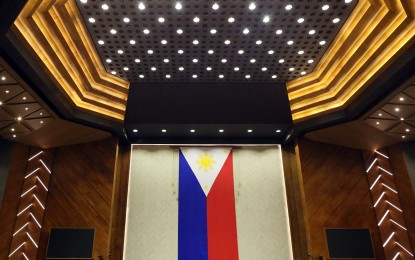
Session hall of the House of Representatives (PNA file photo)
MANILA – The Korean Chamber of Commerce-Philippines (KCCP) on Tuesday expressed support for the proposed constitutional amendment that would allow more foreign investments in Philippine education, as it would help colleges and universities become more globally competitive.
During the hearing of the House Committee of the Whole on Resolution of Both Houses No. 7, KCCP president Hyun Chong Un said more Koreans and foreign students would come to the country if there are foreign schools operating here with the planned liberalization of Philippine education.
“It will make Philippine education more competitive. It will benefit the Philippines,” he said.
He informed the panel that at present, some 50,000 Koreans are enrolled in local schools.
The KCCP president also told the Committee of the Whole that his group shares the stand of the Joint Foreign Chambers of Commerce supporting the proposed economic constitutional amendments.
Another resource person, Robin Michael Garcia, who described himself as an educator and a social scientist conducting lectures here and abroad, stressed need for the Philippines to modernize its education system.
Garcia said the lackluster performance of local schools is proven by the fact that Philippine universities are in the bottom of 500 globally ranked universities.
“Their counterparts in some ASEAN countries are in the top 10, top 50,” he said.
Garcia argued that the quality of education available in a country has a significant impact on the development of a prosperous state and an effective and efficient government.
During the committee hearing on Monday, Commission on Higher Education (CHED) chair Dr. Prospero de Vera III said other Asian countries have opened up to foreign ownership and control of educational institutions in higher education, making these institutions more competitive in their internationalization efforts.
"The Philippines is one of the very few countries in the region that has restrictions in foreign ownership and participation in higher education,” de Vera said.
De Vera cited Malaysia and Singapore as models of countries that not only amended their laws to allow foreign companies to participate in their higher education structure, but even gave incentives to encourage foreign schools to set up and participate in the provision of higher education.
The CHED, according to de Vera, is of the position that the liberalization of the higher education system should also include incentives to entice foreign nationals and foreign companies to open higher learning institutions in the country.
Lawyer Joseph Noel Estrada, chief legal counsel of the Congressional Commission on Education II, said only the Philippines has foreign ownership, establishment and enrollment restrictions stipulated in the constitution.
“Foreign equity participation in educational institutions cannot exceed 40 percent except those established by religious groups or mission boards. Educational institutions exclusively for aliens, diplomatic personnel and their dependents may only be established in the Philippines via legislation,” Estrada said.
Estrada compared the Philippines to Singapore, Malaysia and Thailand in so far as maximum foreign ownership of educational institutions is concerned and found that the Philippines allows only 40 percent, while the three countries allow 100 percent foreign equity participation.
Estrada proposed giving incentives and doing policy adjustments; strengthening the capacity of the Department of Education (DepEd), CHED and Technical Education and Skills Development Authority (TESDA) to regulate the entry of poor-quality institutions; using research by industry; and reviewing government regulations in a way that enables quality institutions to thrive.
Speaking for TESDA, lawyer Kimberly de Asas said the agency recognizes the necessity of reframing the nation’s economic policy to keep up with the demands of increasingly globalized age, while considering protecting the Filipino First Policy that guides the economic provisions of the constitution.
She assured the panel of TESDA's "readiness to provide its utmost support” for the liberalization of the ownership of educational institutions.
Meanwhile, DepEd Undersecretary Omar Romero said the agency “strongly” opposes the proposed constitutional amendment on lifting the foreign ownership restrictions in basic education due to its “far-reaching consequences and serious implications" to the mandate of the department and the exercise of its function.
Romero said allowing foreign ownership in the sector could affect the sense of nationalism of Filipino students, notably by weakening “fundamental aspects of Filipino identity, culture and values.”
“It is essential that the Philippine curriculum is exclusively implemented by Filipino citizens. This ensures alignment with the specific needs and context of the country,” he said. (PNA)
